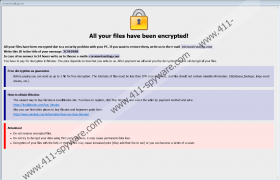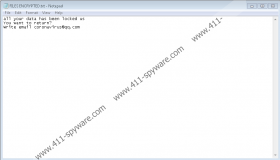NCOV Ransomware Removal Guide
NCOV Ransomware is a malicious program that wants to rip you off. This infection targets computers that run on the Windows operating system. Like most of the other ransomware programs, it encrypts user’s files and then displays a ransom note, telling users to pay up for the decryption. Do you really have to pay for that decryption? No. You should never consider spending your money on something that might not even work. Not to mention that you would be giving these criminals what they want. Simply follow the manual removal instructions to delete NCOV Ransomware from your system, and then look for ways to restore your files.
This infection is not a new player in the field.NCOV Ransomware comes from the Crysis/Dharma Ransomware family. Thus, the infection is rather similar to Devil Ransomware, Devos Ransomware, 2048 Ransomware, and many other infections we have discussed before. In fact, the ransom notes displayed by the infections from this group are usually quite similar if not identical. It allows us to assume that the people behind NCOV Ransomware do not spend too much time creating new infections. They just tweak the old ones a little bit, and off they go spreading them.
Unfortunately, that doesn’t mean that one decryption tool fits all the programs in the family. They require unique decryption keys, and so if there was a public decryption tool available for any of the previously released programs, it is very likely that it won’t work for NCOV Ransomware. Hence, you need to do everything you can to mitigate the ransomware infection damage.
How can we ensure that our systems suffer as little as possible? Well, creating a file backup is a good idea for starters. The idea of transferring your files to an offline hard drive might not be too attractive, but it’s one of the best ways to protect your files. Also, you can set up a cloud drive where you can save your files automatically. Thus, if your computer gets infected with NCOV Ransomware or any other similar program, you can be sure that at least some of your data will remain safe. Let’s not forget that public decryption tools for individual infections aren’t that common, so you have to be ready for the worst.
Also, you can prevent NCOV Ransomware from entering your system by deleting all the spam emails with attachments that drop into your inbox. Sure, sometimes it might be hard to tell which emails are malicious and which are genuine, but if that is the case, you can use a reliable antispyware scanner to scan the received files. If the files are malicious, you will be informed at once.
However, if NCOV Ransomware enters your system, the program will immediately lock up most of your files, and you will see the following pop-up on your screen:
All your files have been encrypted!
All your files have been encrypted due to a security problem with your PC. If you want to restore them, write us to the e-mail coronavirus@qq.com
<…>
You have to pay for decryption in Bitcoins. The price depends on how fast you write to us. After payment we will send you the decryption tool that will decrypt all your files.
There’s also more information in the ransom note, but the bottom line is clear: you have to pay or else say goodbye to your files. Of course, we have already mentioned that paying is not an option. Therefore, remove NCOV Ransomware today, and then invest in a security application that will help you terminate all the malicious files from your computer.
To find out more about potential file recovery options, be sure to address a local technician. Although, if you have a file backup, you just need to delete the encrypted files and transfer the healthy ones back into your computer.
How to Remove NCOV Ransomware
- Remove the newest files from Desktop and the Downloads folder.
- Press Win+R and type %TEMP%. Click OK.
- Remove the latest files from the directory.
- Delete the FILES ENCRYPTED.txt ransom note dropped in the affected directories.
- Use the Win+R again to access the following folders:
%ALLSUERSPROFILE%\Application Data\Microsoft\Windows\Start Menu\Program\Startup
%ALLUSERSPROFILE%\Microsoft\Windows\Start Menu\Programs\Startup
%APPDATA%
%APPDATA%\Microsoft\Windows\Start Menu\Programs\Startup
%WINDIR%\System 32 - Delete the random EXE files and the Info.hta file from the directories mentioned above.
- Run a full system scan with SpyHunter.
NCOV Ransomware Screenshots:



